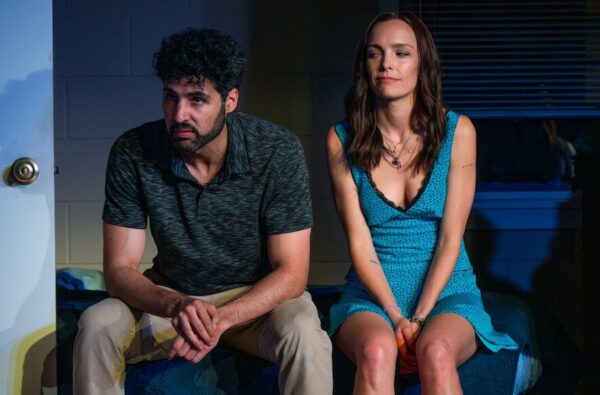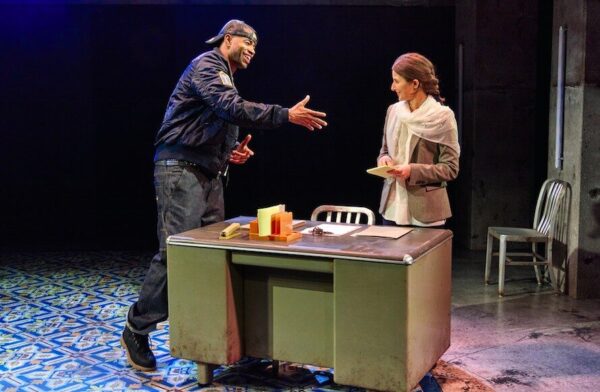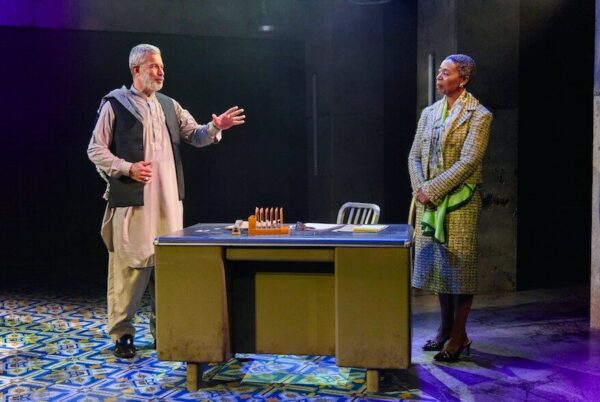Two unconventional plays about odd romantic pairings recently opened Off-Broadway. Both attempt to tackle significant topics outside of the “boy-meets-girl” arena, and both come up short. Abby Rosebrock’s Lowcountry at Atlantic Theater Company takes the awkward-first-date premise into dangerous territory but stretches credulity too much for its themes to reach full impact.

Credit: Ahron R. Foster
Both participants in the rendezvous are seriously damaged individuals. David (Babak Tafti, deftly conveying suppressed trauma) is a divorced father emerging into the dating world after wearing an ankle monitor for a sexual offense (the true nature of his crime is slowly revealed during the course of the date). By court order, he must attend a recovery program for sex addicts and report to a probation officer who has issues of his own (Keith Kupferer in an effective cameo). David’s date Tally (Jodi Balfour in a kinetic, jittery performance) is a hot mess returning to her hometown after stints in Los Angeles as an actress and gig worker. She’s still dealing with the death of her mother when she was a child as well as coping with her difficult father.

Credit: Ahron R. Foster
Their encounter takes place in David’s cramped apartment in small-town South Carolina (Arnulfo Maldonado designed the realistic, squalid setting). According to the terms of David’s parole, any encounters must be in public. The play opens as he is preparing a pasta dinner for Tally while lying about the location to his parole officer Paul in his regular phone check-in. The main focus of the play is David and Tally’s clumsy attempts to connect. Rosebrock uses their fumbling reaching out to provide social commentary on our fractured society. (Perhaps that could be the meaning of the title, indicating our polarized, degraded American culture as well as the coastal region of South Carolina.) David is foreign-born, adopted and made a citizen as a child. His country of origin is never revealed but the specter of ICE deportation hangs over him like a menacing cloud. Tally drinks and smokes weed to cope with her rage, presumably over her mother’s early demise which she claims was brought on by the mom’s dislike of then President Bill Clinton.
Jo Bonney’s direction is well-paced and Tafti and Balfour deliver compelling portraits of two desperate losers oppressed by bad luck and bad choices. But Rosebrock’s central theme is not entirely clear. Is she saying our divisive culture has pushed David and Tally into an impossible corner with no escape but tragedy? Tally’s motives are not focused either, though they gradually become somewhat clearer. The play does culminate with a shocking act of violence which is not completely earned by the proceeding character development. In the script provided, Rosebrock reveals Lowcountry is part of a trilogy. Perhaps the other two plays would explain further.

Credit: Jeremy Daniel
Meanwhile, Charles Randolph-Wright’s Duke & Roya, another couple-oriented play at the Lortel, can’t make up its mind if it wants to be an opposites-attract rom-com or a serious political drama. Duke (a charismatic Jay Ellis) is a chart-topping rap artist who meets cute with Roya, an Afghan translator (compelling and fierce Stephanie Nur) while he is entertaining American troops in Kabul in 2017. Like Rosebrock, Randolph-Wright seeks to cover larger themes than romance. He indicts our foreign policy as Roya and her father who also works as a interpreter (solid Dariush Kashani), are cast aside when the US leaves Afghanistan.
There’s also an interesting examination of gender roles in Arab culture. The intelligent Roya reveals to Duke she was raised as a boy until puberty and still occasionally cross-dresses as a male because of her country’s misogynist dictates. Political observations are overshadowed by the treacly storyline with Duke using his wealth and influence to attempt to rescue Roya who wants to remain in Afghanistan and fight for women’s rights. There are also accusations of terrorism, a bombing, and a ridiculous subplot with Roya’s dad hooking up with Duke’s high-powered mom (complex and multi-leveled Noma Dumezweni), an international attorney.

Credit: Jeremy Daniel
There are loose threads in the plot. Roya’s connection with an underground Afghan activist accused of engineering the bombing which injures Duke is introduced but never developed or sufficiently explained. There are occasional stabs at depth when the title duo debate race relations, foreign policy, and their respective governments oppressing minorities. Randolph-Wright settles for sentiment and a superficial glossing over of the geopolitics which push Duke and Roya apart. Accomplished playwrights such as Tom Stoppard, David Hare and Lynn Nottage have been able to combine trenchant observations with personal storylines, but the balance is off here.
Warren Adams’ cinematic staging keeps the action flowing with the aide of Amina Alexander’s space-defining lighting and Caite Hevner’s projections. Ronve O’Daniel’s sizzling original music and lyrics and Taylor J. Williams’ sharp sound design provide Duke with a credible chart-topping soundtrack and Sanowber Sabrina Spanta’s stylish costumes help define the characters.
There is definite chemistry between Ellis and Nur and both are convincing as a media superstar and feminist warrior respectively. Too bad the play doesn’t go deep enough.
Lowcountry: June 24—July 13. Atlantic Theater Company at the Linda Gross Theater, 330 W. 20th St., NYC. Running time: 90 mins. with no intermission. atlantictheater.org.
Duke and Roya: June 25—Aug. 23. Lucille Lortel Theater, 121 Christopher St., NYC. Running time: two hours and 20 mins. including intermission. dukeandroya.com.
